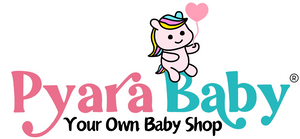From First Steps to Big Leaps: A Guide to Child Development & Positive Parenting Tips

Watching your little one grow is one of the greatest joys of parenting. From their first smile to their first steps, each stage of development brings new milestones and challenges. Understanding these stages helps parents support their child’s growth, physically, emotionally, and socially. A playschool should believe in nurturing every moment with care, love, and natural goodness. This guide will walk you through the key stages of child development and offer simple, positive parenting tips to help your baby thrive.

What is Child Development?
Child development is the process through which children grow and learn new skills over time. It covers everything from physical growth, like height and weight, to how they think, talk, move, and interact with others.
Every child develops at their own pace, but most follow a general pattern of progress. These changes happen in different stages and are grouped into cognitive (thinking and learning), emotional and social (how they express feelings and connect with others), speech and language, and physical (movement and coordination).

Understanding child development milestones helps parents know what to expect and how to support their little one’s growth in a healthy, positive way.

5 Stages of Child Development
Understanding the different child development stages helps parents support their child’s growth in a more focused and caring way. Each stage comes with its own set of milestones, challenges, and joyful moments.
1. Newborn Stage (0–2 months)
During the first few weeks of life, babies are adjusting to the world outside the womb. They rely entirely on caregivers for comfort and care. At this stage, babies begin to respond to sounds, make eye contact, and show signs of bonding. Newborn baby milestones, like a smile, are very common during this age.
2. Infant Stage (2–12 months)
This is when growth picks up speed. Infants begin to smile, roll over, sit up, crawl, and even start babbling. They become more aware of their surroundings and start forming emotional attachments. Gentle touch, tummy time, and soothing routines help build strong foundations during this stage.
3. Toddler Stage (1–3 years)
Toddlers are always on the move, walking, talking, and exploring, making up their daily routine. They also begin to show more independence and a wide range of emotions. Positive discipline, encouragement, and safe spaces to play are key during this phase.
4. Preschool Stage (3–5 years) 
This is a time of big imagination and learning. Children start asking questions, building friendships, and learning important life skills like sharing and waiting for their turn. Choosing the right preschool age is important to support their social and cognitive development.
5. School-Age Stage (6–12 years)

As kids grow older, they begin to develop stronger thinking skills, emotional control, and social awareness. School life becomes a big part of their world. Encourage open communication, curiosity, and balanced routines to help them succeed in and out of the classroom.

What are Developmental Milestones for Kids?
Developmental milestones are skills or behaviours most children reach by a certain age. These help track your child’s growth across key areas.
-
Social/Emotional Milestones
Kids start showing emotions, forming bonds, and learning how to play and share with others. -
Cognitive Milestones
They begin to explore, solve simple problems, and understand basic concepts like shapes and colours. -
Language or Communication Milestones
Children learn to make sounds, say words, follow directions, and express their needs. -
Movement or Physical Development Milestones
From rolling over to walking and jumping, kids gain better control of their body movements.

Positive Parenting Tips for Healthy Child Development
-
Showing Warmth and Affection
Hug your child often and use kind words to build trust and emotional security. -
Communicating with Your Child
Listen actively and speak clearly so your child feels heard and understood. -
Setting Routines and Limits
Consistent routines and gentle boundaries help kids feel safe and well-guided. -
Spending Quality Time Together
Play, read, or simply talk, being present strengthens your bond. -
Giving Them a Sense of Responsibility
Let them help with small tasks to build confidence and life skills. -
Allowing Them to Make Mistakes
Mistakes are part of learning; support them without judgment. -
Promoting Healthy Behaviours
Encourage good sleep, nutritious food, hygiene, and outdoor play. -
Being a Good Role Model
Kids learn by watching, and practice the values you want them to follow.
 Every child grows at their own pace, but understanding the stages of development and using positive parenting can make a big difference in their journey. With love, patience, and the right guidance, you can help your little one thrive at every age.
Every child grows at their own pace, but understanding the stages of development and using positive parenting can make a big difference in their journey. With love, patience, and the right guidance, you can help your little one thrive at every age.



1 comment
My ex-fiancé was cheating on me, but I had no proof and I felt crazy and paranoid at that time; I even felt I was losing my mind. I needed closure badly, and I hired hacksecrete@gmailcom, although it’s unethical, and it’s something I had to do. Just tell him I sent you… Though I am not proud of what I did but I had no choice; I was almost driven to the brink of suicide, he can also incur debt on credit cards. You can also WhatsApp or text him at +1 (564) 224-5803. you can also reach him if you’re not able to withdraw your funds from any online trading platform like ExpertOption, Cal Financial, Analyst, Coinspot, Ctxprime, and many more